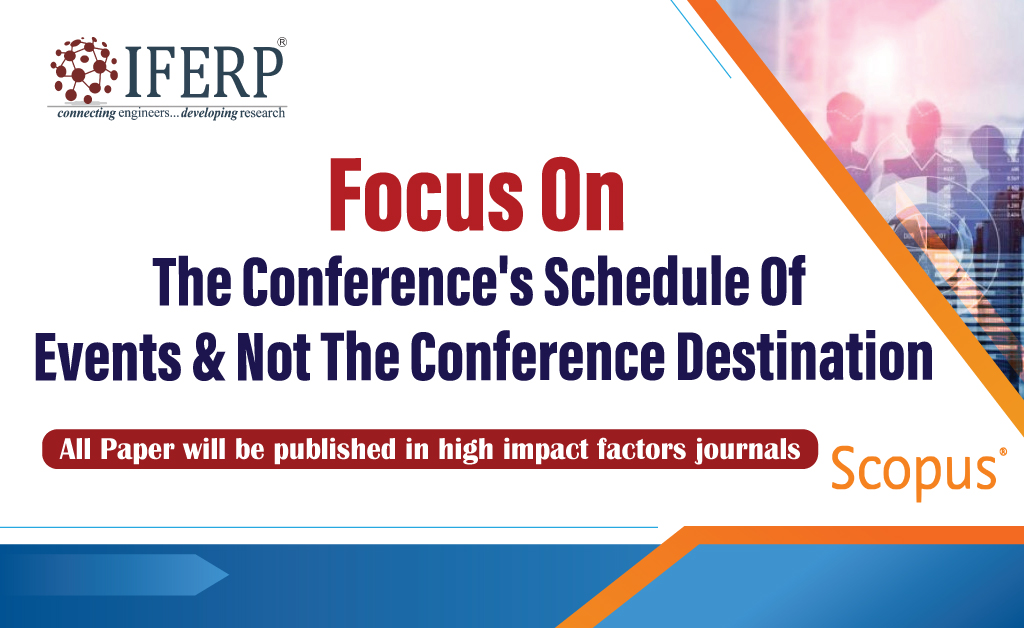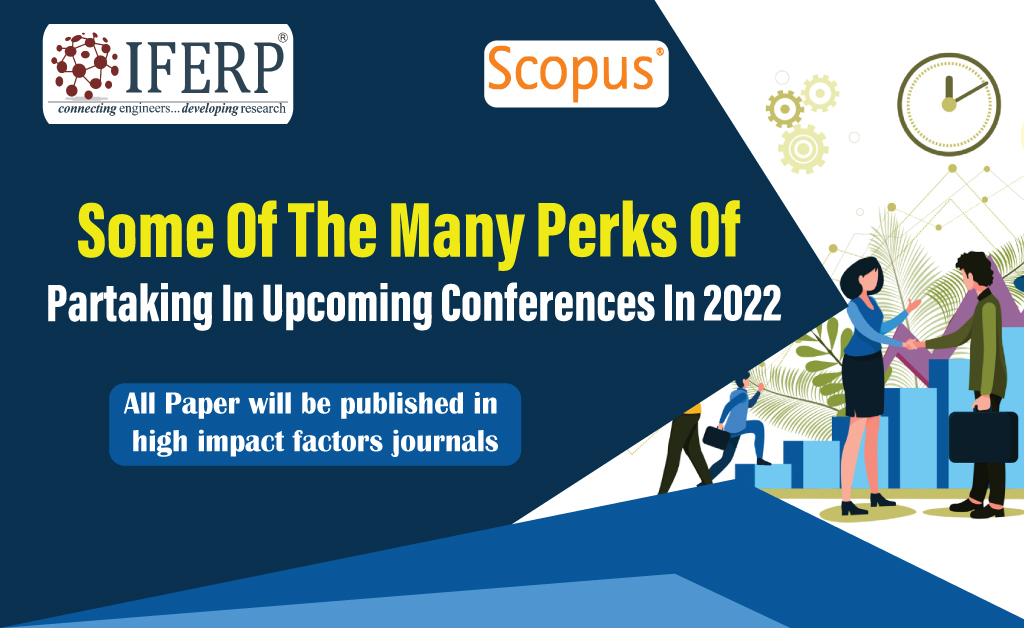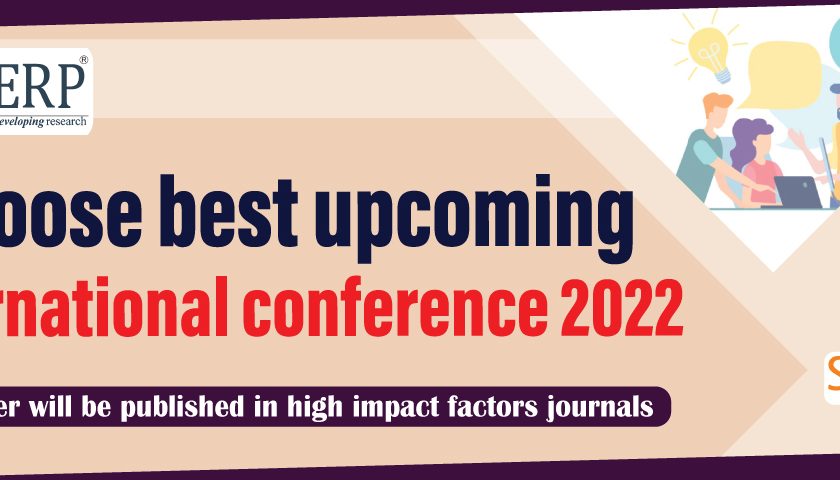The Essence Of Every Upcoming Engineering & Technology Conference In 2023
- Every upcoming conference in 2023 will be either a one-day or multi-day event where scholars will present their work to each other.
- These conferences are an important way for researchers to stay connected with others in their field and learn about cutting-edge research.
- Irrespective of the discipline that an academic conference is focussing on, researchers usually present their work via a poster or an oral presentation.
Choose The Best Upcoming International Conference 2023
- The upcoming conferences in 2023 will be of different types.
- International academic conferences are primarily aimed at faculty rather than students, although virtually all conferences do feature students presenting their own research work either as co-authors alongside a supervising faculty member or solo as part of a special student program.
- International academic conferences 2023 can be international, national, regional, or local. There are also lectures dedicated to the different subfields of a focus discipline or subdiscipline.
- Some academic conferences are specifically devoted to undergraduate research.
- The focus is solely on students, and programming often includes hands-on workshops, such as how to get into graduate school and how to look for a career.
- No matter how niche one’s discipline might be, one is guaranteed to find multiple upcoming conferences in 2023 focussing on their subject of interest.
Presenting Research Findings – What’s In It For The Presenter?
- There are many benefits associated with presenting one’s work at an international conference in 2023.
- For example, participants who’ve presented at numerous conferences before all attest to the fact that they –
- learn a lot from the research of others,
- make valuable contacts through networking,
- find the experiences useful in preparing them for higher education courses, research ventures or careers,
- improve their presentation skills, and
- get to present their work in front of a global audience of their peers and experts in their field.
- An overwhelming number of conference participants, when asked about attending conferences, describe the experience as life-changing or positive and have more positives to report, while a few report just a handful of negatives.
Is Being Just A Participant Valuable? It Sure Is!
An upcoming Scopus indexed conference in 2023 is a great opportunity to meet people and learn more about one’s field of interest, and it would be a shame to waste such an opportunity. Here’s how one can benefit fully from being just a participant at any one of the upcoming conferences in 2023.
- Preparing To Exploit The Event Thoroughly
- Conferences are usually provided online prior to the conference.
- Make a game plan before you leave, noting which sessions you absolutely want to attend.
- Most conferences have plenary sessions or keynote speakers – usually, no other sessions are scheduled during these times as everyone is expected to attend the conference.
- Go to these sessions, even if the title or summary doesn’t initially sound appealing.
- The people chosen for these sessions are leaders in their field.
- Having a shared experience with other conference attendees can give you something to discuss with others.

- Focus On The Conference’s Schedule Of Events & Not The Conference Destination (In The Case Of A Holiday Destination Event)
- Conferences often take place in fun destinations, so it can be tempting to skip conference events and turn the trip into a vacation.
- Sure, you should have fun during the conference, but think of it this way – what if everyone at a conference skips everything but their own presentations?
- We would all give presentations to empty rooms, and your institution, had it funded your trip, would have lost its investment in watching you learn and grow as a researcher.
- Planning For Funding
- With transportation, food, accommodation, and registration costs, attending an academic conference can be expensive.
- Many universities offer funds to students who have been accepted to present at a conference.
- If you are unsure how to find out about funding, contact your faculty mentor, department chair, or research institution.

Some Of The Many Perks Of Partaking In Upcoming Conferences In 2023
- Liminal Space & Transformative Learning
- The academic conferencing space is often recognized as unfamiliar by students, offering learning opportunities different from those commonly encountered in academia.
- Academic conferencing is a whole different world, and it’s not something like students or researchers live in their institutions.
- Conferencing feels like it’s not contrived, and it offers that realism that participants don’t get very often in a course.
- A Chance To Get Used To Being Outside Of The Comfort Zone
- As a liminal space, academic conferencing represents an authentic, new, stimulating, and initially disruptive space for the participants, exposing their vulnerability and uncertainty.
- Participants often talk about being pushed beyond their comfort zone.
- But there is also a consensus that is persisting in this space gradually dissolves these concerns, most often due to the nurturing environment, and that leads to a relevant challenge – participants can be a little nervous about undertaking their research in an area where other people they don’t know might be able to critique it, and it’s still a bit scary but exciting and useful at the same time.
- Getting Used To Dealing With Different Perspectives
- They may ask them a question, and it may confuse them, and then they may have to think a bit which is a very good experience.
- The genuine interest that is evident in audiences helps change the perceptions of participants.
- They are fully aware that they are communicating their research to an attentive audience with no barriers to hide behind.
- In university and higher educational settings, there always seems to be this student-teacher barrier, and participants feel like their supervisors, and faculty members are there to assess them.
- At events such as academic conferences, participants feel more on an equal footing with people, and they can just chat about things.
- Finding One’s Voice
- This demonstrates the transformational nature of the conference experience for participants who have found their “voice” and are clearly finding recognition as researchers.
- Student participants often end up feeling like mini professionals as it’s really strange for them not to feel like students.
- They begin feeling respected rather than having the perception that they’re thought of as lazy students.
- Participants of academic conferences can become who they want to be, rather than what they think a piece of paper says they should be.
- Participants often leave conferences seeing themselves empowered in the future, thinking about how they might leverage their own research in a way that adds to broader disciplinary discourse.
- Experiencing What It’s Like To Be On A Common Playing Field
- At conferences, what participants have in common with the keynote speakers and other guests is that they are there as researchers – it is about the knowledge, research, and that is their common touchstone.
- An increase in self-esteem is also common to all participants and provides evidence of the transformative experience of the research cycle currently being completed.
- Academic conferences, therefore, can be conceptualized as liminal spaces which involve risks and uncertainties and in which there are changes in power relations with participants acknowledging that their understanding is in a state of contested flux as well as promoting reflections on identity and feel like truth seekers.
- Transformational learning is disruptive insofar as it leads to questioning accepted assumptions and viewpoints and to new ways of knowing and understanding.
- Transactional Communication
- In any high-level 2023 international conference, the cyclical flow of ideas, with students rethinking and refining their understandings, will be clearly evident.
- This is completely different from a university presentation, as a participant may be interviewed by people they are not studying with and who most likely are experts in other areas relevant to their own research.
- This can result in a two-way exchange of information in which a presenter who is presenting and the participant who is asking the questions gain a better knowledge of the field.
- Learning To Engage & Take More Risks
- The conference environment allows participants to advance their thinking and perhaps to take more risks in their remarks.
- Responsibilities of presenters to accept engagement in dialogue and to answer questions that may be difficult are balanced by the right of delegates to ask questions, to suspend judgement until satisfied, and to propose alternatives, adopting responsibility to do so constructively.
- It is a learning partnership.
- Fostering Inquisitiveness
- Difficult questions keep presenters going.
- If they just keep going on about their presentation, but if someone stops them and asks them, “what’s going on here?”, they’re forced to wonder and improve.
- To be able to ask questions, participants need to think about their own words and the perspective outside of themselves.
- Participants recognize that engaging with different perspectives gives them an enhanced learning experience.
- The questions people ask presenters give them a different insight into their subject.
- It’s also nice to be able to carefully absorb what presenters say and formulate a question that will help them in turn.
- Developing A Liking For Presenting
- Presenters often appreciate those participants who come up to them and say, “have you thought about that” or “how does that impact your work?’.
- It opened up fields of reflection for them that they would not have thought of otherwise.
- Thus, engaging in academic conferences arouses in many participants and presenters the desire to help others.
- Presenters are able to recognize the usefulness of questions and comments on their work, and they want to selflessly give back to the research community.
- This desire to help others is a step towards mutual respect and empathy between researchers – people should respect each other’s disciplines for what they are because everyone’s research has value in different ways.
- Engaging In Collaborative Thinking & Learning
- Being able to mingle and network with people who do completely different things helps participants understand and appreciate what people do.
- Participants often describe how the two-way exchange of thoughts and ideas improved their ability to ask and answer good quality and sometimes difficult questions that could transform the thinking of the other, describing this as empowerment.
- Reciprocal elucidation characterized instances where participants were engaged in transactional transactions.
- Communication at a level high enough to allow the mutual challenge of knowledge or way of thinking, favoring the development of self-authorship is what academic conferences are all about.
- Developing Self-Authorship
- The cognitive, intrapersonal, and interpersonal development of conference participants is phenomenal.
- There is a strong implication that conference participation experiences broaden the cognitive horizons of participants by providing greater exposure to their research.
- Participants increasingly speak of escaping their cocoons, leaving their safe places and familiar contexts of their modules, courses, and disciplines, to shed their blinders and acquire a synoptic view of their research, its disciplinary context, and the interconnections between the subjects.
- Engaging In Discourse With People With Different Various Viewpoints
- Many participants talk about the interest and the pleasure of engaging with researchers from different disciplines.
- They become aware of the bounded nature of their discipline, but also how permeable borders and outward-looking disciplinary specialists can enable the cross-fertilization of knowledge, methods, and ideas.
- Realizing The Multidisciplinary Nature Of Research
- It’s interesting how it all overlaps.
- Participants start off thinking they’re doing a definite topic, and it’s fascinating when they start realizing that everything is kind of a big Venn diagram.
- In a small seminar environment, it is not likely that people necessarily bring different perspectives to the table, whereas when they collide with other people in a conference environment, it can be more dynamic and more fruitful because there is more diversity.
- Talking to people from other scientific disciplines, seeing the kind of parallels, what one is doing is actually just a subset of a senior scientist.
- The internal communication process involved in clarifying concepts, reflecting on ideas, and analysis of information form the basis of intra-personal development.
- The transition to research being seen as a process rather than a finished product is reflected upon by many conference-goers.
- There are still changes to be made, there are still questions that people can raise that participants might not have thought of, but it gives them great confidence in themselves, knowing that it is a good base to move forward from.
- This is good insofar as it helps participants to develop their own thoughts.
- But it’s also testing them to come back with the answers, then they just speed up the development of their work and make it stronger and more coherent.
- Participants don’t really get that sort of an experience in-class, whereas, at academic conferences, they’re eager to receive criticism while waiting for questions.
- There’s a certain sense of community that participants feel, especially when they’re discussing ideas and being critical – there is this feeling of helping each other to develop and become better.
- Accelerating Learning Through The Dissemination Of Research Findings
- Disseminating the results of one’s research is an important part of any type of research undertaking, whether it be undergraduate research work, postgraduate research work, or professional/industrial research work.
- If no one else ever learns of the research, then no one can rely on what the researchers have discovered.
Participants are guaranteed to be elated by the conference experience – they will learn a lot and be motivated to continue their research in the future. Find a list of every upcoming conference in 2023 right here on this page. Peruse through our massive list of events in all fields and sub-disciplines set to take place in 2022, find the event or events you’re interested in participating in, register immediately to book your place, and then participate to benefit fully from these world-class conferences.



One comment
Comments are closed.